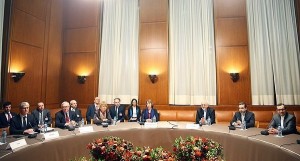
GENEVA/BRUSSELS, Dec 19 (Reuters) - Iran and six world powers began expert-level talks in Geneva on Thursday to work out how to put into practice a landmark deal obliging Tehran to curb its nuclear programme in return for some relief from economic sanctions.
Discussions on the details of last month's breakthrough accord were interrupted by Tehran diplomats last week, after a decision by the United States to blacklist 19 more Iranian companies and individuals.
But diplomats said much progress had been achieved in the four-day meeting on Dec. 9-12 in Vienna, and expressed hope they could wrap up the practical discussions at meetings in Geneva on Thursday and Friday.
That could mean the seven countries - the United States, Russia, China, France, Britain,Germany and Iran - would be ready to agree on a date when the accord goes into effect.
Specifically, they would decide when western governments lift some economic sanctions and Iran curbs its most sensitive nuclear work.
"We were at an advanced stage in Vienna," said a diplomat from one of the six world powers. "A lot of work has been done so we can go very fast."
The diplomat, who spoke on condition of anonymity, cautioned, however, that some western diplomats were concerned Iran could be "more difficult" in the technical discussions because of Washington's decision to expand sanctions this month.
The nuclear accord is designed to halt Iran's nuclear advances for a period of six months to buy time for negotiations on a final settlement of the decade-old standoff.
Iran rejects western suspicions that its atomic work is aimed at acquiring nuclear weapons, and says it is for peaceful purposes only.
U.S. officials have said the new blacklistings should not complicate the practical talks and are part of U.S. efforts to continue exposing those supporting Iran's nuclear programme or seeking to evade current sanctions.
DETAILING CONCESSIONS
In the technical discussions, experts aim to resolve issues dealing with how exactly sanctions can be lifted and what specifically Iran must do to meet its obligations on suspending parts of its nuclear work.
Diplomats said some issues had already been resolved in Vienna last week, including some aspects of how the U.N. nuclear watchdog, the International Atomic Energy Agency, will verify what Iran has done before the deal can be put into effect.
Questions remain on how western governments will ensure banks understand what transactions are allowed under the softened sanctions regime, and how and when Iran will be allowed to access several billion dollars worth of oil revenues frozen in overseas accounts.
Scope for easing the dispute peacefully opened after the June election of a comparative moderate, Hassan Rouhani, as Iranian president. He won in a landslide by pledging to ease Tehran's international isolation and win relief from sanctions that have severely damaged the oil producer's economy.
By Reuters
The Iran Project is not responsible for the content of quoted articles

 QR code
QR code